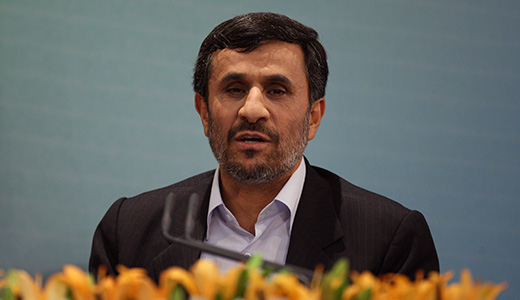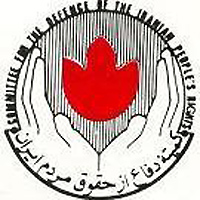
Having announced in November last year, in spite of all evidence to the contrary, that the Iranian economy was “booming,” President Ahmadinejad more boldly proclaimed recently that unemployment in Iran would be eradicated in two years. With official unemployment at 14.6 percent, and much higher according to unofficial estimates, this is indeed a wild claim.
Flying in the face of reality however has not been a problem for Ahmadinejad who praised Iran’s economic “development” further in a speech on Feb. 28 in which he asserted that “Iran is one of the few countries in the world where no one goes to sleep hungry.”
Workers in Khorammabad were quick to pick up on the president’s words when he visited their town on March 1. Ahmadinejad was faced with banners proclaiming that the local factory workers were indeed hungry and that they had had enough of Ahmadinejad’s “official optimism” about the economy.
It is unlikely that those workers will have had access to the Economist Intelligence Unit’s (EIU) Iran report (December 2010) which would have told them that high inflation would be a factor in Iran’s economy for the next four years. The current inflation rate is 15 percent, which Ahmadinejad has responded to by keeping the exchange rate artificially high. The outcome of this strategy is that the price of foreign goods remains more stable than those produced in Iran, at Khorammabad or elsewhere, meaning that Iranian-produced goods remain on the shelves.
These are facts which the factory workers in Khorammabad would not need the EIU report to understand. They would also fully understand the doubling of the price of bread and the quadrupling of gas prices in recent weeks, pushing them further into poverty and, in spite of Ahmadinejad’s pronouncements, hunger.
Protests in the major cities of Shiraz and Isfahan, as well as the capital Tehran, have underlined the growing discontent in recent weeks. Al Jazeera reported that “silent” protests in Shiraz on March 27 were broken up by the regime’s feared Basij corps on motorcycles.
The official IRNA news agency reported that Faezeh Rafsanjani, the daughter of ex-President Ali Akbar Hashemi Rafsanjani, had been among those arrested for participating in the protest. Fars news agency reported that she was released shortly thereafter.
Arrests took place in the Azerbaijan province during the traditional spring festival on April 2 while Amnesty International has indicated that 70 Azerbaijani citizens were arrested in Tabriz and 20 others at Uremieh at the same time.
While tackling any open signs of protest with its usual display of brute force and arrest the government is also taking measures to restrict the development of Iran’s civil society. As online news agency Rooz reported recently:
“The Majlis, Iran’s parliament, is in the process of approving a bill that according to civil activists aims at eliminating independent civil institutions and replacing them with government organization.
According to the provisions of this bill not only are individuals who plan to establish non-governmental or civil organizations required to be fully cleared and approved by the Ministry of Intelligence and supervisory committees, but even organizations that already have operational licenses and have been active need to reapply for new permits. If the latter are not approved, the supreme supervisory committee will annul their current permits and ban their activities.”
The approval or otherwise of civil society organizations has, until now, been the provenance of the judiciary in Iran, thus restricting the ability of the security forces to interfere. The current bill, in moving responsibility to the supreme supervisory committee, would create the basis for a pseudo government-operated civil society.
According to Sohrab Razzaghi, managing editor of Arseh Sevom (Civil Society), the bill would be “yet another nail in the coffin” of civil society in Iran. In relation to civil associations in Iran, Razzaghi went on to say that the bill would:
“… deny them their freedom and would result in the elimination of all the achievements that people have gained in this respect by the government. The implementation of this bill would end the life of the country’s independent civil society and in its place create an obedient and quiet dependant society.”
Arseh Sevom, along with Nobel laureate Shirin Ebadi and eight other civil and human rights organizations, has issued a statement expressing concern over the bill.
Former MP Mousavi Khoeiniha sees the bill as part of a wider push to neutralize opposition in the build-up to the 2013 presidential elections:
“The recent Majlis election and the issues that have come up since are concerning for the regime,” he said, so they are planning for the upcoming Majlis and presidential elections and believe that civil society institutions will cause them problems then.”
There is little doubt that as the economic crisis in Iran worsens the population is turning to more open ways of expressing their anger against the regime’s policies. As the repressive machinery of the state moves into higher gear, with the approach of the 2013 presidential election, the means of opposition will also diversify.
Solidarity with the Iranian people will be more vital than ever to ensure that the tactics of the regime are exposed and that the true voice of the people of Iran, both on the streets and in the organizations of civil society, is heard.
Photo: Iranian President Mahmoud Ahmadinejad speaks at a press conference in Tehran, Iran, April 4. (AP /Vahid Salemi)










